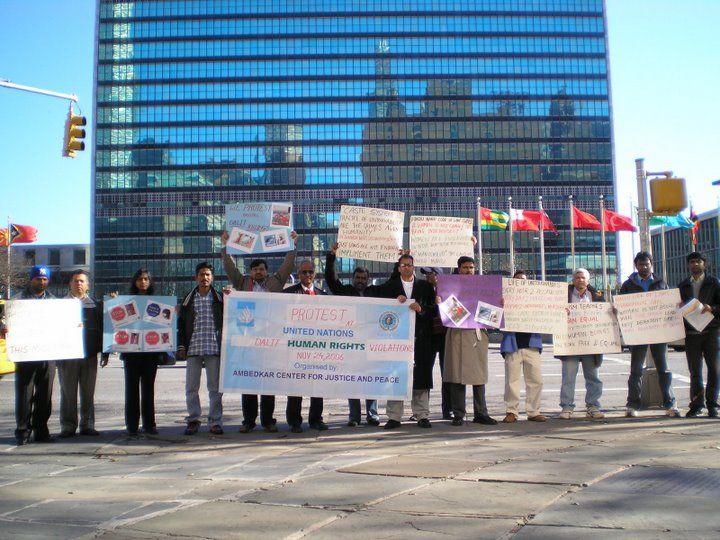
United Nations directed India to start Human Rights Education
It is important to note that CERD (Committee on the Elimination of Racial Discrimination) gave a very valuable recommendation in its 1996 Treaty Body CERD Concluding Observations (CERD/C/304/Add.13 dated 17/09/96 article 31) stating“The committee recommends a continuing campaign to educate Indian population on Human Rights, inline with the constitution of India & universal Human Rights Instruments, including the International Convention of All Forms of Racial Discrimination. This should be aimed at eliminating the institutionalized thinking of the high caste and low caste mentality”.
India has not implemented it yet.
India has not implemented it yet.
Overview of our Work
Overview
ACJP (Ambedkar Center for Justice and Peace) was founded in 1991, the year of Dr. Babasaheb Ambedkar's BIRTH CENTENARY by Mr. Yogesh Varhade, a businessman in North America. He started participating in the United Nations Human Rights Division, Geneva from July, 1991 onwards.
As Dr. Ambedkar said,” There is a South Africa in every village in India.” The caste system and practice of Untouchability is so deeply entrenched in rural India that even after 70 years of Independence a simple act of fetching water from the local well by a Dalit (Untouchable) is considered to be polluting. They are thus at the mercy of the upper caste Hindus and have to wait till they throw a bucket of water in their pot without any social interaction. Dalits are treated as untouchables from cradle to grave, even though it is a criminal offense prohibited by constitution. Their population is about 300 million, nearly equal to population of USA, or equal to that of UK, France, and Germany combined.
India has 17% of global population and accounts for nearly 50% of child labour, 50% of bonded labour, and 50% of trafficking Girls and women of the world.
Atrocities like killings, rapes, beatings, burning their homes etc in the name of caste/religion are on the rise.Everyday there are 3 dalits killed, 5 dalit girls and women raped and for every recorded case of rape nine go unrecorded. This is a massive problem which needs immediate attention of the state. India needs to resolve these issues if it wants to grow as peaceful, powerful democracy where equality, liberty, secularism, fraternity and social justice thrives side by side .
ACJP has attended most of the major UN human rights conferences globally and Treaty Bodies deliberations on state party India since 1991 and highlighted the massive challenge of eradication of caste-based discrimination in South Asia. The biggest challenge facing United Nations in 21st Century is the eradication of caste system. First we need to educate the global civil society who can help us when we follow the path of fall of South African Apartheid through United Nations.
As Dr. Ambedkar said,” There is a South Africa in every village in India.” The caste system and practice of Untouchability is so deeply entrenched in rural India that even after 70 years of Independence a simple act of fetching water from the local well by a Dalit (Untouchable) is considered to be polluting. They are thus at the mercy of the upper caste Hindus and have to wait till they throw a bucket of water in their pot without any social interaction. Dalits are treated as untouchables from cradle to grave, even though it is a criminal offense prohibited by constitution. Their population is about 300 million, nearly equal to population of USA, or equal to that of UK, France, and Germany combined.
India has 17% of global population and accounts for nearly 50% of child labour, 50% of bonded labour, and 50% of trafficking Girls and women of the world.
Atrocities like killings, rapes, beatings, burning their homes etc in the name of caste/religion are on the rise.Everyday there are 3 dalits killed, 5 dalit girls and women raped and for every recorded case of rape nine go unrecorded. This is a massive problem which needs immediate attention of the state. India needs to resolve these issues if it wants to grow as peaceful, powerful democracy where equality, liberty, secularism, fraternity and social justice thrives side by side .
ACJP has attended most of the major UN human rights conferences globally and Treaty Bodies deliberations on state party India since 1991 and highlighted the massive challenge of eradication of caste-based discrimination in South Asia. The biggest challenge facing United Nations in 21st Century is the eradication of caste system. First we need to educate the global civil society who can help us when we follow the path of fall of South African Apartheid through United Nations.
Achievements
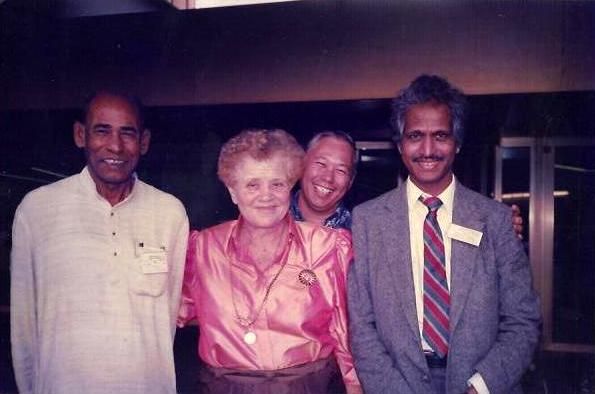
1991
ACJP introduced Caste System and Practice of Untouchability to United Nations bodies since 1991, like Human Rights Council and its earlier organ. (CERD in 1996 had a detailed discussion during the India Report which also helped UN to focus on the study of Caste-based discrimination in South Asia.)
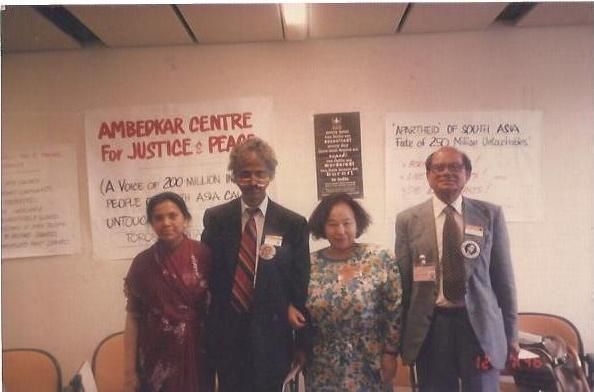
1993
World Conference on Human Rights at Vienna, Austria: In Prepcom Bangkok where all asia pacific ngos met, passed the resolution :“ to condemn the practice of Caste System and Untouchability, which is crime against humanity, and Countries should eradicate it within 10 years time or face sanctions”. This was also passed in Planery Session in Vienna. In Vienna,many EU members assured us that this issue was long overdue to be discussed in UN and they would help us.
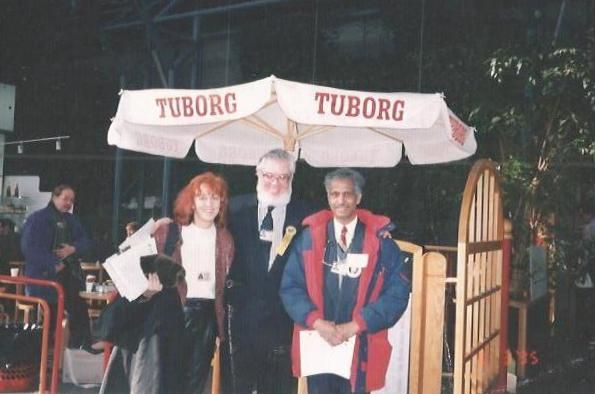
1995
UN World Summit on Social Development at Copenhagen, Denmark National News media gave a special attention to cover the caste system, practice of untouchability, child labour, bonded labour, Devadasi system through THE POLITICKEN, AND BERLINGSKE TIDENDE daily newspapers which educated the National and Global civil society with very positive impact.
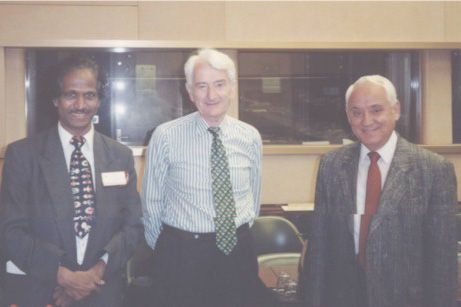
1996
Treaty Body CERD Concluding Observations-Recommendations in (Article 31, CERD/C/304/Add.13dated 17/09/1996} on Human Rights Education to the Nation which states” India to start continuing human rights education in line with Indian Constitution and UN Human Rights Instruments including Convention on Racial Discrimination. This should be aimed at eliminating high caste and low caste mentality.”
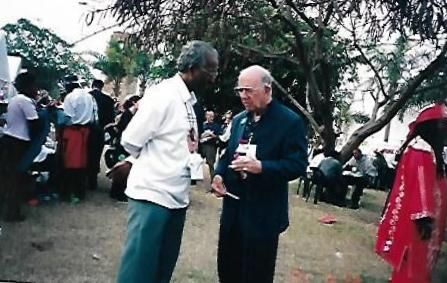
2001
UN World Conference Against Racism at Durban , South Africa.“ ACJP was primarily responsible to bring the issue of Caste System and Discrimination in United Nations World Conference Against Racism. “ said Smita Narula -HRW group during Durban. We had given many TV/Radio interviews on the Caste System and practice of Untouchability.Caste System was fully exposed at global level for the first time.
Timeline
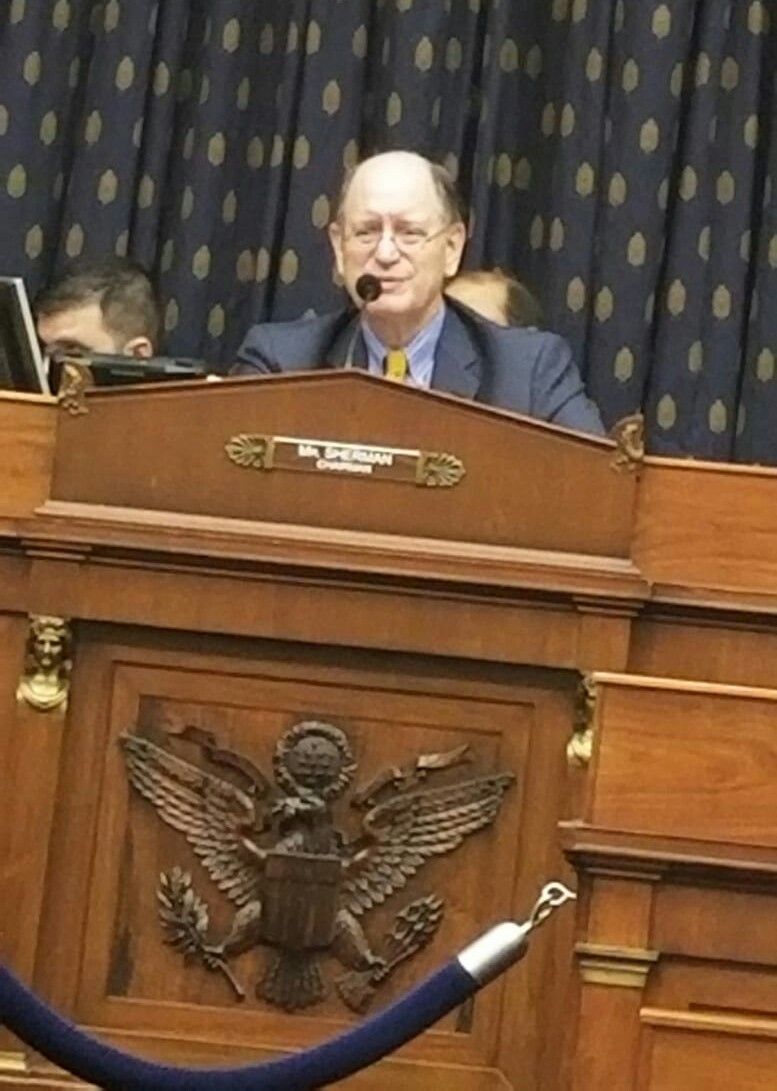 2019: US Congress hearing in the Sub-Committee on South AsiaAttended US Congress hearing organised by Sub-Committee on India: Under , Chairmanship of Congressman Brad Sherman and the Subject was Kashmir Lock-down under 370, its tragic effects on Kashmir Population like safety, security, food,health, media etc.
2019: US Congress hearing in the Sub-Committee on South AsiaAttended US Congress hearing organised by Sub-Committee on India: Under , Chairmanship of Congressman Brad Sherman and the Subject was Kashmir Lock-down under 370, its tragic effects on Kashmir Population like safety, security, food,health, media etc.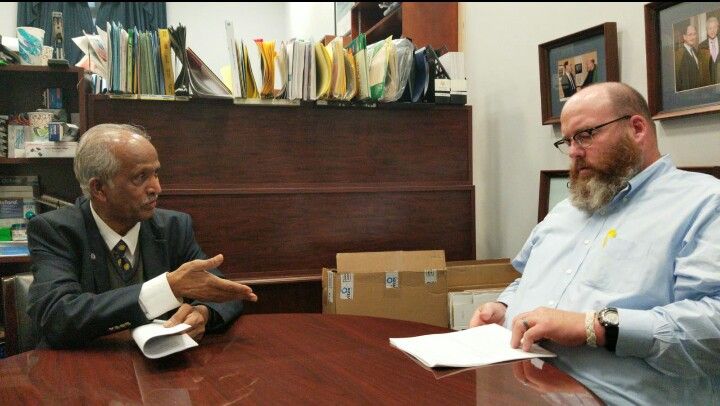 Muslim participants came from all over US and some Sikhs and acjp, on behalf of Dalits were present. 6 Congressmen including Madam JAYPAL, showed great concern about Kashmiri Lockout , no communication with outside world. Later I had meeting with Brad Sherman’s Chief of the staff and discussed the pathetic condition of 300 million Dalits and Tribals. Atrocities on them being doubled since BJP rule 2014.
Muslim participants came from all over US and some Sikhs and acjp, on behalf of Dalits were present. 6 Congressmen including Madam JAYPAL, showed great concern about Kashmiri Lockout , no communication with outside world. Later I had meeting with Brad Sherman’s Chief of the staff and discussed the pathetic condition of 300 million Dalits and Tribals. Atrocities on them being doubled since BJP rule 2014.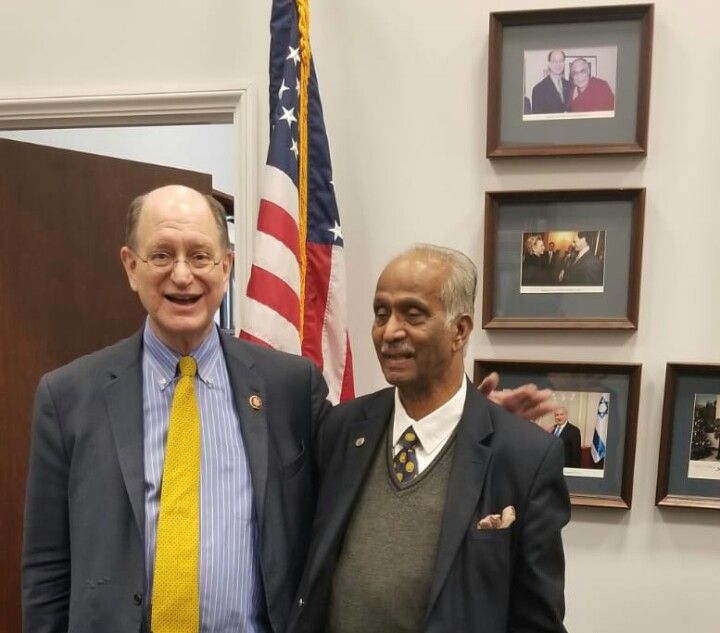 Memorandum was submitted to his office. committee. Dalit problem being 10x bigger, the Committee needed to hold next hearing in “ Human Rights Violations of Dalits in South Asia”. My Congressman’s Office fully supported our stand.
Memorandum was submitted to his office. committee. Dalit problem being 10x bigger, the Committee needed to hold next hearing in “ Human Rights Violations of Dalits in South Asia”. My Congressman’s Office fully supported our stand.- 2018: UNHCHR Geneva:Participated in UNHCHR Geneva ,in the forum for Migrant workers and made statement in the UN about the 40,000 + Dalit Namshudras Rufugees from west Bengal coming from Bangladesh who were directed by CM Jyoti Basu to settle in the Dandakaranya area and later on 26 January 1979, ordered ban on food supply to these people who revolted against this, and he sent 27 police vessels with guns and 40,000 plus refugees children, women and men were killed.
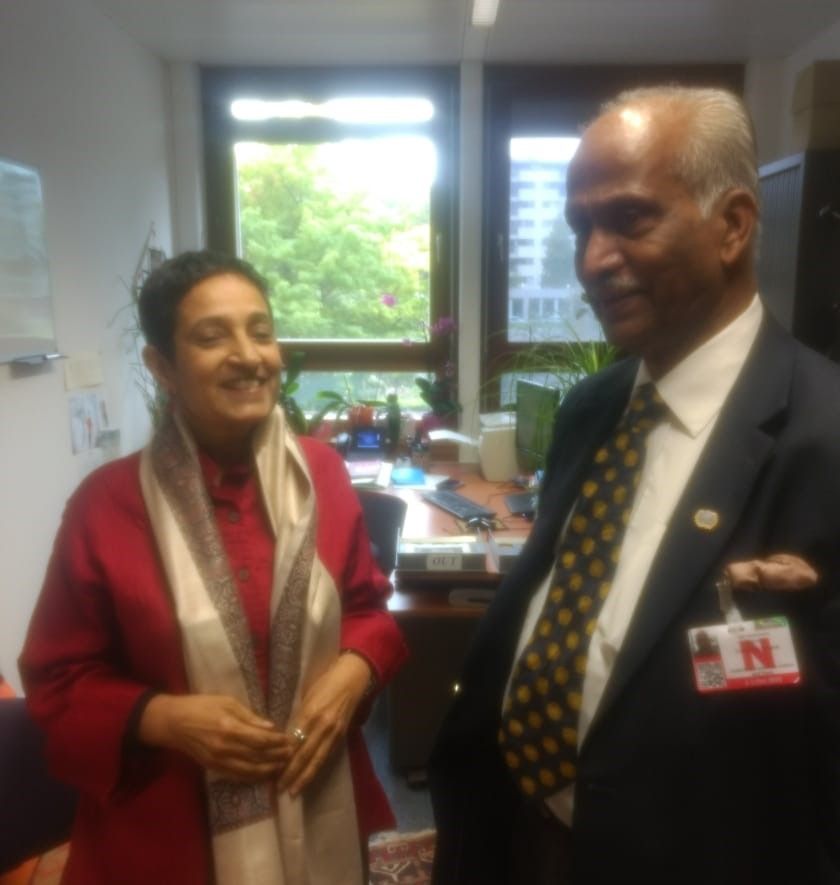 It is a historical fact that Nehru and Mahatma Gandhi had both assured people during the partition that if east bengal people were forced to join Muslim BanglaDesh, they coupld return back if they wanted to . Mostly they were Namshudras, the Scheduled Caste of Bengal. CM even prohibited media and parliamentary committee to investigate the massacre. We requested UN to investigate the facts and punish the guilty for this genocide as per international laws. (Refer Book-Blood Island by Deep Haldar, the oral history of the Marichjhapi Massacre-2019)
It is a historical fact that Nehru and Mahatma Gandhi had both assured people during the partition that if east bengal people were forced to join Muslim BanglaDesh, they coupld return back if they wanted to . Mostly they were Namshudras, the Scheduled Caste of Bengal. CM even prohibited media and parliamentary committee to investigate the massacre. We requested UN to investigate the facts and punish the guilty for this genocide as per international laws. (Refer Book-Blood Island by Deep Haldar, the oral history of the Marichjhapi Massacre-2019) - 2017: September UPR3 Discussion on India at Geneva Attended.India implemented very few recommendations , said Human Rights Watch ACJP lobbied with Norway, Denmark, and Germany for Atrocity Act violations.
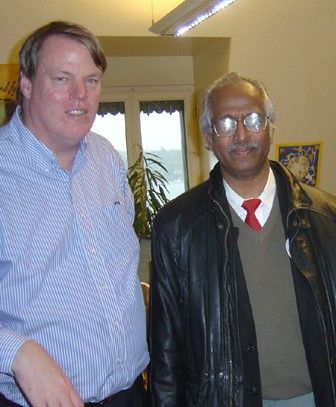
- July 2016: UN conference on Role of world governments in the field of Human Rights
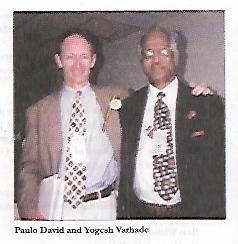
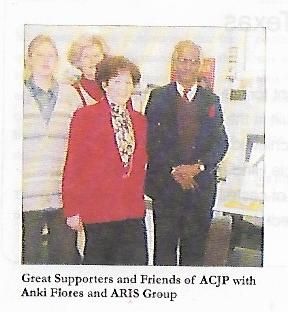 Participated in United Nation Conference at New York on the role of world governments in the field of Human Rights and discussed with UN senior officials about the challenges, UN faces to eradicate caste based discrimination.
Participated in United Nation Conference at New York on the role of world governments in the field of Human Rights and discussed with UN senior officials about the challenges, UN faces to eradicate caste based discrimination. - 2015: Global conference on Trafficking of the girls and women globally
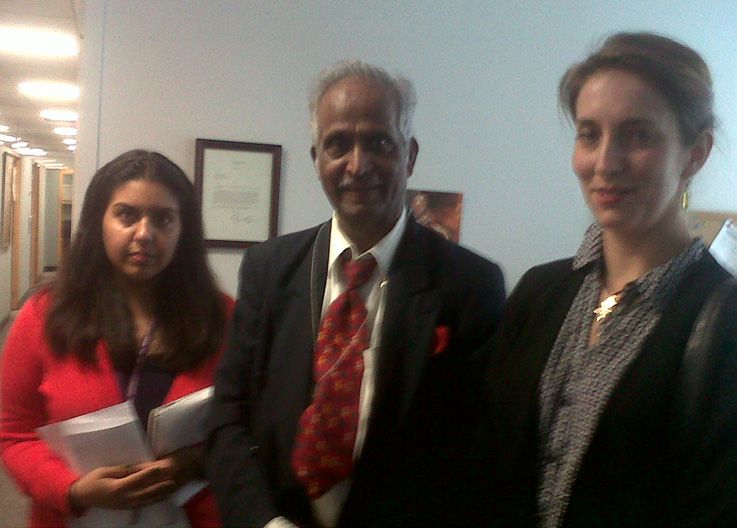 Participated at New york in the global conference on Trafficking of the girls and women globally and met the Special Rapporteur on Trafficking, to discuss the challenges in eradicating the Trafficking of girls and women in South Asia which is a very serious matter for India has 17% of global population and is responsible for 50% of Trafficking of girls and women in the world and she mentioned that India refused her request 6 times to visit India.Participated in CEDAW at Geneva, discussed the India report and submitted ACJP alternative report on Eradication of discrimination against women and girls.Participated in Committee on the Rights of Child (CRC) during the India report discussion and submitted the ACJP alternative report on child rights.
Participated at New york in the global conference on Trafficking of the girls and women globally and met the Special Rapporteur on Trafficking, to discuss the challenges in eradicating the Trafficking of girls and women in South Asia which is a very serious matter for India has 17% of global population and is responsible for 50% of Trafficking of girls and women in the world and she mentioned that India refused her request 6 times to visit India.Participated in CEDAW at Geneva, discussed the India report and submitted ACJP alternative report on Eradication of discrimination against women and girls.Participated in Committee on the Rights of Child (CRC) during the India report discussion and submitted the ACJP alternative report on child rights. 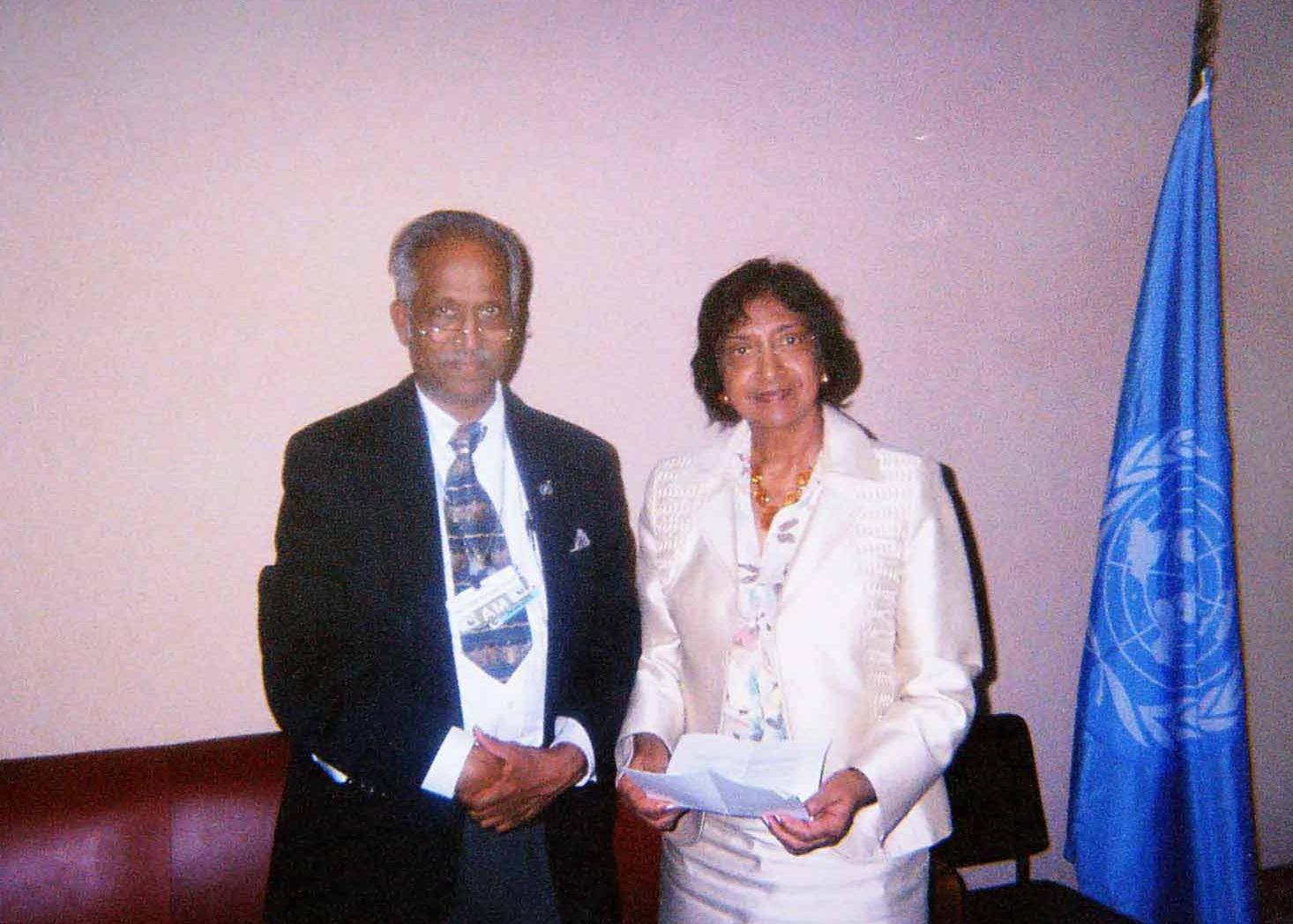 July 2014: Special meeting with Madam Navnethem Pillay in Geneva on Caste based discriminationHad a special meeting with Madam Navnethem Pillay in Geneva to discuss the caste based discrimination and what UN can do to help India to eradicate it, like it had helped to eradicate Apartheid of South Africa, as India is sitting on a time bomb of social unrest which may explode into a full-fledged civil war if unheeded.She is a granddaughter of indentured labour brought by the British to South Africa and she showed lot of empathy but India did not allow her to open the branch of UN HRDivision.
July 2014: Special meeting with Madam Navnethem Pillay in Geneva on Caste based discriminationHad a special meeting with Madam Navnethem Pillay in Geneva to discuss the caste based discrimination and what UN can do to help India to eradicate it, like it had helped to eradicate Apartheid of South Africa, as India is sitting on a time bomb of social unrest which may explode into a full-fledged civil war if unheeded.She is a granddaughter of indentured labour brought by the British to South Africa and she showed lot of empathy but India did not allow her to open the branch of UN HRDivision.- January 2013:Helped National Human Rights Commission to host Two Days camp in Nagpur and deal with 155 Human Rights violation cases of SC and ST in Maharashtra region which failed to get justice. Camp was very successful under the supervision of Chairman of NHRC, Justice Balakrishnan, CJ,(rtd) Supreme Court of India.
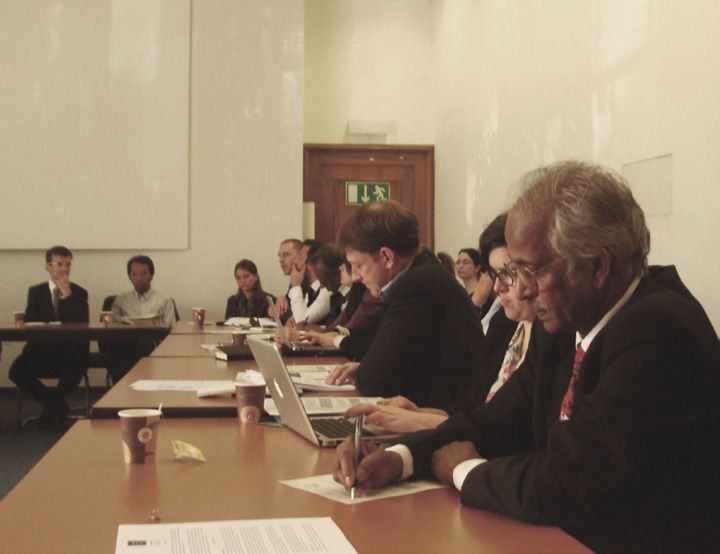 March 2012Attended pre-session organized by UPR 2 Info, a global advocacy organization in Geneva, on India report discussion in 2nd cycle scheduled on May 24 2012.During pre-session, 20 countries shown their interest on Human Rights Situation in India. Most of the countries expressed their concerns on caste-based discrimination, child labor, bonded labor, girls trafficking, extreme poverty and dehumanization due to the practice of untouchability as per caste system.
March 2012Attended pre-session organized by UPR 2 Info, a global advocacy organization in Geneva, on India report discussion in 2nd cycle scheduled on May 24 2012.During pre-session, 20 countries shown their interest on Human Rights Situation in India. Most of the countries expressed their concerns on caste-based discrimination, child labor, bonded labor, girls trafficking, extreme poverty and dehumanization due to the practice of untouchability as per caste system.- May 2012: Universal Periodic Review of India & European Parliament Visit
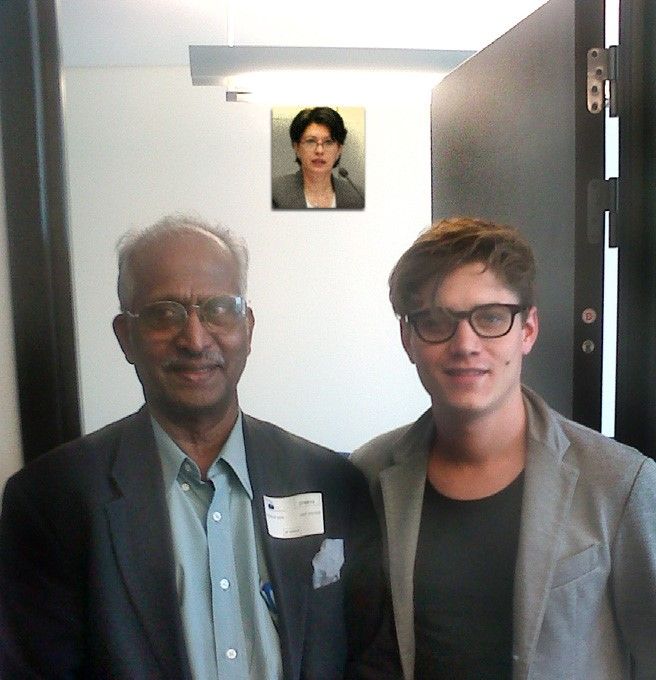 ACJP delegation attended Universal Periodic Review of India report under Human Rights Council at United Nations, Geneva held on 24 May 2012. 85 member states raised questions on various issues concerning human rights.185 questions were asked by 85 countries on various human rights violations like caste discrimination, untouchability, violence against women, land rights of tribal, poverty, destitution, child labor, bonded labor and child trafficking. For the first time, 11 countries posed questions on caste based human rights issues.On 17th of September 2012, India accepted 79 recommendations including monitoring mechanism in the field of human rights.In September 2012 ACJP did lobbying at the European Parliament during the debate on free trade pact between EU and India. Mr. Varhade had three meetings with the Deputy of distinguished Members of E. Parliament namely 1) Barabara Lochbihler, Chair Sub-committee on Human Rights, (Germany), 2) Dr. Syed Kamall, (UK) 3) Vice Chair, EUP, Mr. Edward McMillan (UK), and discussed urgent need to address Child Labor, destitution and dehumanization due to caste system imposed on 250 million SC/STs in India.
ACJP delegation attended Universal Periodic Review of India report under Human Rights Council at United Nations, Geneva held on 24 May 2012. 85 member states raised questions on various issues concerning human rights.185 questions were asked by 85 countries on various human rights violations like caste discrimination, untouchability, violence against women, land rights of tribal, poverty, destitution, child labor, bonded labor and child trafficking. For the first time, 11 countries posed questions on caste based human rights issues.On 17th of September 2012, India accepted 79 recommendations including monitoring mechanism in the field of human rights.In September 2012 ACJP did lobbying at the European Parliament during the debate on free trade pact between EU and India. Mr. Varhade had three meetings with the Deputy of distinguished Members of E. Parliament namely 1) Barabara Lochbihler, Chair Sub-committee on Human Rights, (Germany), 2) Dr. Syed Kamall, (UK) 3) Vice Chair, EUP, Mr. Edward McMillan (UK), and discussed urgent need to address Child Labor, destitution and dehumanization due to caste system imposed on 250 million SC/STs in India. - 2011: UPR2 Prepcom meet in GenevaIt was the Universal Periodic Review 2 of India. We presented the paper on atrocity, child labor, bonded labor, devdasi system exploitation of little girls.and met many UN officials.
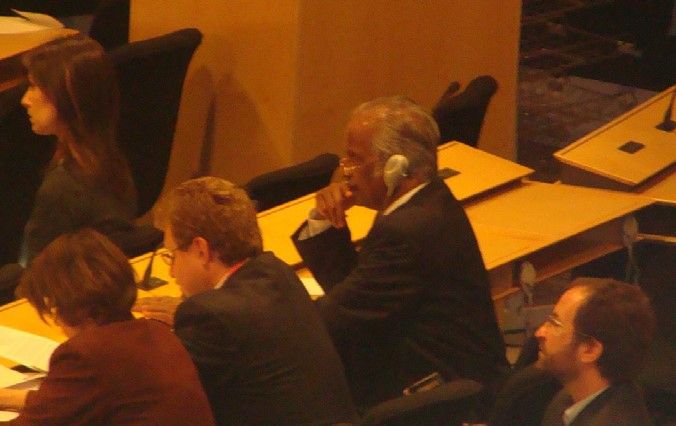
- 2010: UN-Millennium Development Goals at NYParticipated in UN, Millennium Development Goals Conference and did interventions in Child Labor seminar in New York organized by UNICEF. Brazil set up examples for the world to improve Human Development Index for the Brazilians and also in the development in the field of women and children. The honorable minister for social justice had extended the invitation to visit Brazil for observation. The plenary situation of MDG had a very interactive session on the development of women.
- 2009: Durban Review Conference, HRC-Geneva & IHEU at London- In April 2009 ACJP participated in the Durban Review Conference which was a follow up to World Conference Against Racism(WCAR) racial discrimination & xenophobia held in Durban,2001.IHEU held an international convention and ACJP was invited to speak on Dalit issue. IHEU passed resolution to urge UNHRD to discuss these issues.- ACJP delivered a shor t speech in the Human rights Council debate on caste based discrimination and its impact in south Asia which was telecasted by HRC.
- ACJP was granted a special meeting with Madam Pillay, UN high commissioner for human rights and Madam Pillay was briefed on pioneering work of ACJP since 1991 due to which United Nation started debating on caste based discrimination.
- ACJP was invited and participated in International Humanist Ethical Union (IHEU) conference in June 2009 at London and presented the dehumanizing effect of caste system and other negative impacts on a quarter billion population of India.
- A resolution was passed urging United Nation to eradicate the hidden Apartheid of South Asia as soon as possible. - 2008: UN Committee on Economic, Social & Cultural Rights-Geneva & EU visit and Foreign Relations Committee of USA- Participated in UN Committee on Economic, Social and Cultural Rights during India Report Discussion in the month of May and submitted memorandum to the committee on Economic Social Cultural Rights(ESCR) on the issues of Dalits and how India failed to abide by the UN convention on ESCR for the marginalized.- Met and discussed with WHO and ILO officials in Geneva on SC/ST issues.- Discussion held with Director of the Human Rights division of European Union and briefed him on atrocities committed on SC/STs, 3-6% conviction rate of the perpetrators and practice of untouchability in full force in rural India, destitution and dehumanization of this 250 million SC/ST including half of the world child labors, bonded labor and child prostitution (Devadasi System). It is good news that EU passed the first resolution to condemn the caste system and asked India to take a proactive stand not long ago.
- ACJP also conducted meetings with EU MPs and discussed the current situation of SC/STs in India including caste system and child labor and asked MPs to discuss with India to take a proactive stand. - 2007: CERD (Geneva) and UNESCO (Paris)- Attended UN Committee on Elimination of Racial Discrimination (CERD) in Geneva during India Report Discussion and presented the problems of caste discrimination affecting more than 250 millions SC/ STs including 100 million child labor in schools, forcing untouchables to do unhygienic jobs like cleaning latrines and carrying dead animals for their basic survival. ACJP also discussed latest Human Rights violation like Khairlanji lynching of a dalit family. ACJP submitted the report of nodal officer of Maharashtra concerning Khairlanji Report with recommendations, which were discussed extensively in the CERD committee.
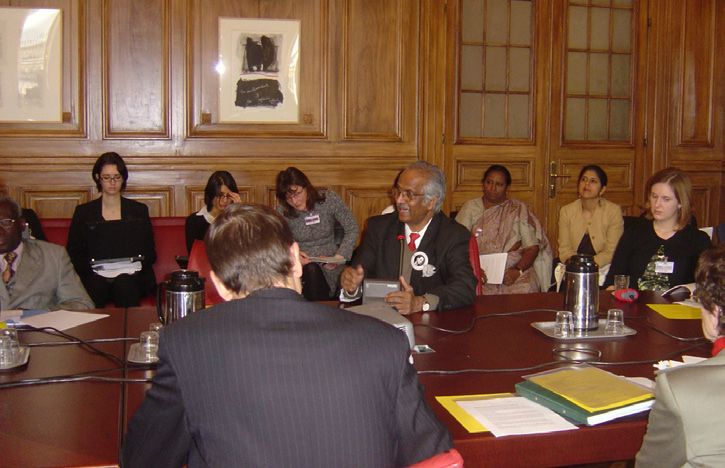 - ACJP also recommended to CERD to bring in their final recommendations the need for separate settlement for dalits in the atrocity prone areas effective immediately to prevent similar incidents in the future.- Attended Pre-session of UN Committee on Economic, Social and Cultural Rights Working Group Discussion on India and submitted recommendations for 2008 CESCR meeting.
- ACJP also recommended to CERD to bring in their final recommendations the need for separate settlement for dalits in the atrocity prone areas effective immediately to prevent similar incidents in the future.- Attended Pre-session of UN Committee on Economic, Social and Cultural Rights Working Group Discussion on India and submitted recommendations for 2008 CESCR meeting. - 2006: California School Board on Indian History & NY celebration- ACJP participated through its members in the California School Board debate on Indian History education about caste system in the Hindu religion. After a hot debate ACJP delegates along with other proactive members succeeded in convincing the board members that the present education on the caste system in Hindu religion was accurate and should be continued in the history books.- ACJP celebrated Dr. Babasaheb Ambedkar’s birth Anniversary in Columbia University and distinguished Colombia professors categorically stated that Dr. Ambedkar’s scholarship and contribution to build a new India was far superior than any other Indian including Mahatma Gandhi.
- 2005: World Summit on Information Society-TunisiaACJP was invited and participated in UN World Summit on Information Society (WSIS) at Tunis. NGO forums around the world joined hands together and passed a resolution which became part of the final document of declaration regarding the right of every child to have free access to IT. “It is the Human Right of every child to have free access to Information Technology” [November (16-18), 2005].
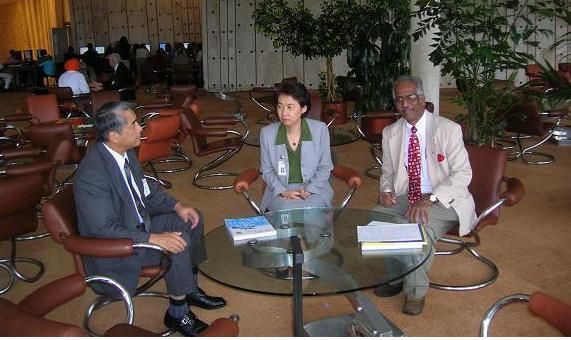 In spite of the best Constitution in the world, and all the protective laws for the Scheduled Castes and Scheduled Tribes (Dalits and Tribals), the discrimination ,destitution and dehumanisation of these 300 million people is continued due to misguided psyche of high caste and low caste mentality and there is no end in sight. India has 17% of global population and carries the burden of half of the world’s child labour and bonded labour as well as 50% of Trafficking of girls and women, who are mostly from Dalits and Tribals. There is no serious attempt to enforce the laws because the will of the government has been missing. If the government does not take it seriously, it will push India to civil war as it happened in US and other countries.
In spite of the best Constitution in the world, and all the protective laws for the Scheduled Castes and Scheduled Tribes (Dalits and Tribals), the discrimination ,destitution and dehumanisation of these 300 million people is continued due to misguided psyche of high caste and low caste mentality and there is no end in sight. India has 17% of global population and carries the burden of half of the world’s child labour and bonded labour as well as 50% of Trafficking of girls and women, who are mostly from Dalits and Tribals. There is no serious attempt to enforce the laws because the will of the government has been missing. If the government does not take it seriously, it will push India to civil war as it happened in US and other countries.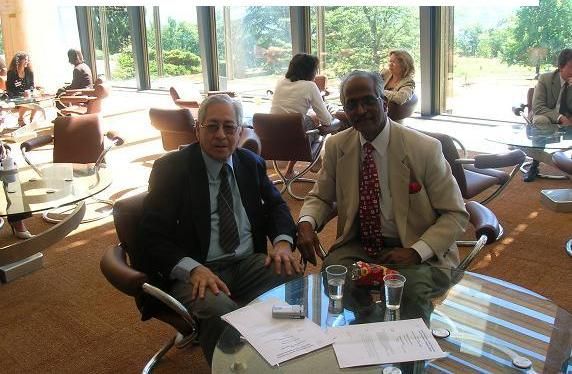 Mr. Soli Sorabji met in 2002 during CERD Thematic Discussion and was representing Government India . As a member of the Parsi community , the minority population, he is quite aware of the problems faced by other minorities.
Mr. Soli Sorabji met in 2002 during CERD Thematic Discussion and was representing Government India . As a member of the Parsi community , the minority population, he is quite aware of the problems faced by other minorities. - 2004: Human Rights Consultations-Canada- ACJP participated in Ottawa, Canada for Human Rights Consultations organized by Ministry of Foreign Affairs of Canada and caste system was discussed in the meeting.- Participated in Toronto Social Forum of NGOs where CNN & 60 minutes documentary “The Untouchables” (Produced and aired in 1999 for which ACJP helped CNN) was shown and discussed, was shocking for the Canadians that, the practice of untouchability still alive and thriving in India.
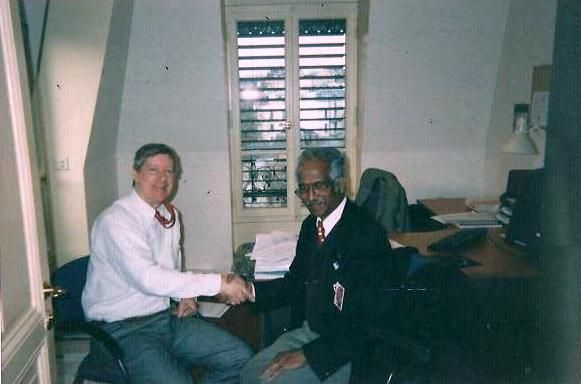
- 2003: World Bank-Washington DCParticipated in World Bank Watchdog meeting at Washington DC in which Mr. Montek Singh Ahluwalia was one of the key speakers along with other world bank officials. ACJP raised the questions of the destitution of the SC/STs in India and some of the senior World Bank Watchdog members from Ghana etc. supported ACJP stand.
- 2002: Working Group on Indigenous Population, CERD –Geneva, UNESCO-Paris,
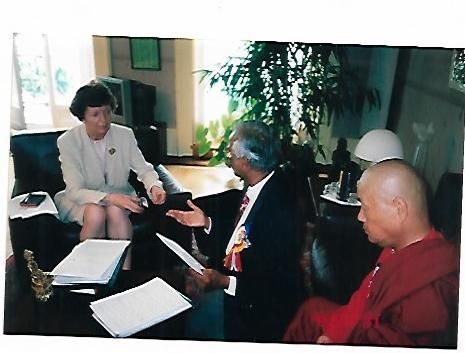 - Participated in UN Working Group on Indigenous Population (WGIP). It is important to note that ACJP has been active in WGIP since 1991. “Dalits and Tribals are indigenous Peoples of India.” was the theme paper submitted to UNWGIP.- ACJP also participated in Committee on Elimination of Racial Discrimination (CERD), “Thematic Discussion on Descent- based - Discrimination”. UN reiterated that Caste bases discrimination is nothing but, discrimination based on descent and well within the definition of Article 1 of the International Convention on the elimination of all Forms of Racial Discrimination., and CERD gave many important recommendations to the Indian Government.- ACJP delegation met the Deputy Director General of UNESCO , Paris, who recently declared that “The BouddhaGaya Temple, where Lord Buddha was ENLIGHTENED, as WORLD HERITAGE SIGHT.- In Paris along with Ven. Arya Nagarjuna Shurei Sasai who presented all historical documents on the claim of Buddhists of India on Buddhagaya Mahavihara in India (Aug 2002).This was later to be followed in India to support the work of UNESCO.- ACJP delegation participated in the Asian Civil Society Forum held at Bangkok in Thailand and highlighted the caste discrimination and gross violation of human rights of 250 million SC/ST community in India. (Dec 2002)- Meeting was held with the Director of South Asia Division of Human Rights Commission to discuss the caste issue in India.
- Participated in UN Working Group on Indigenous Population (WGIP). It is important to note that ACJP has been active in WGIP since 1991. “Dalits and Tribals are indigenous Peoples of India.” was the theme paper submitted to UNWGIP.- ACJP also participated in Committee on Elimination of Racial Discrimination (CERD), “Thematic Discussion on Descent- based - Discrimination”. UN reiterated that Caste bases discrimination is nothing but, discrimination based on descent and well within the definition of Article 1 of the International Convention on the elimination of all Forms of Racial Discrimination., and CERD gave many important recommendations to the Indian Government.- ACJP delegation met the Deputy Director General of UNESCO , Paris, who recently declared that “The BouddhaGaya Temple, where Lord Buddha was ENLIGHTENED, as WORLD HERITAGE SIGHT.- In Paris along with Ven. Arya Nagarjuna Shurei Sasai who presented all historical documents on the claim of Buddhists of India on Buddhagaya Mahavihara in India (Aug 2002).This was later to be followed in India to support the work of UNESCO.- ACJP delegation participated in the Asian Civil Society Forum held at Bangkok in Thailand and highlighted the caste discrimination and gross violation of human rights of 250 million SC/ST community in India. (Dec 2002)- Meeting was held with the Director of South Asia Division of Human Rights Commission to discuss the caste issue in India. - 2001: World Conference Against Racism (WCAR) Durban, South Africa- ACJP was accredited and ACJP delegation had participated very effectively in the World Conference against Racism, Racial Discrimination and Xenophobia held at Durban, South Africa, and lobbied very hard through all media communications including radio and TV interviews on the issue of caste system and practice of untouchability, child labor, child prostitution (devadasi system), bonded labor and the role of civil society members participating in Durban conference. The global media had shown great compassion and interest on this issue. India blocked the earlier resolution pro Dalit passed in the PrepCom by Switzerland.- It is important to note that it was the pioneering efforts of ACJP since 1991, and specially 1996 during CERD India Report discussion, which triggered the debate of caste system in United Nations and brought it to Durban global conference. Smita Narula from Human Rights Watch confirmed it.- Many western democracies like Canada, Norway, Holland, Sweden, and Switzerland had taken keen interest to promote the interests of Dalits. ACJP lobbied very hard to get approved article 73 of Durban Declaration, which was originally proposed by Swiss and approved by UN at Prepcom3 at Geneva and which protected and promoted the interests of SC/STs. It was a global event where about 40000 delegates from all over the world participated.
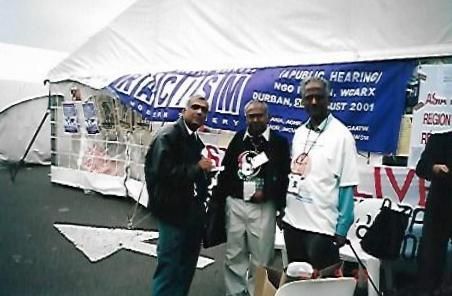 - It is worthy to note that National Human Rights Commission (NHRC) delegation headed by Justice Verma and Justice Dr. K. Ramaswamy played an important part at Durban by making a statement, which admitted that the caste system and practice of untouchability are thriving in India and Indian Government had been working very hard through its constitution to remedy the ills of the society like caste system.- ACJP delegation met Madam Mary Robinson, UN High Commissioner on Human Rights and requested her support on SC/ST issue. (Aug-Sept 2001)
- It is worthy to note that National Human Rights Commission (NHRC) delegation headed by Justice Verma and Justice Dr. K. Ramaswamy played an important part at Durban by making a statement, which admitted that the caste system and practice of untouchability are thriving in India and Indian Government had been working very hard through its constitution to remedy the ills of the society like caste system.- ACJP delegation met Madam Mary Robinson, UN High Commissioner on Human Rights and requested her support on SC/ST issue. (Aug-Sept 2001) - 2000: UN Committee on Rights of Child Geneva, WCAR Prepcom
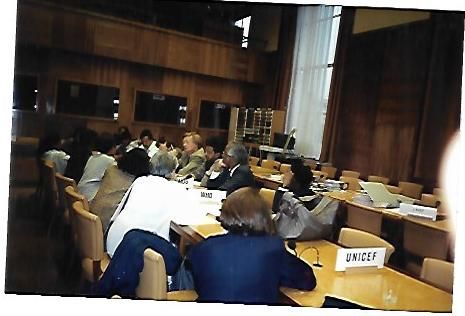 - Participated in UN Committee on Rights of the Child (CRC) in Geneva during India State Party Report discussion. Distinguished experts of the committee accepted most of the recommendations of ACJP to be a part of concluding observations. (Summary records 589, 590 and 591-discussion on caste, child labor, illiteracy, bonded labor, devadasi and practice of untouchability. (Jan.2000) Due to the extensive lobbying of ACJP, the right to education for every child below 14, eradication of the child prostitution (Devdasi System), elimination of discrimination of Dalit children in the rural India, right to shelter and food, and good health, submitting disaggregated data, were emphasized in the concluding observations by the distinguished experts.- Participated in Prepcom on World Conference against Racism (WCAR) in Geneva and highlighted the woes of 250 million SC/ST community, their destitution, deprivation and discrimination, lobbied for bringing the issue of caste at Durban WCAR in 2001. (May 2000)- Mr. Varhade lobbied Senator Moynihan, close friend of President Bill Clinton for his forthcoming trip to India, to raise the issue of caste system, practice of untouchability, child labor, bonded labor and child prostitution (devadasi system), to raise with the Indian Prime Minister, which President Clinton did talk during his speeches in India as the first US president raising these issues in India.
- Participated in UN Committee on Rights of the Child (CRC) in Geneva during India State Party Report discussion. Distinguished experts of the committee accepted most of the recommendations of ACJP to be a part of concluding observations. (Summary records 589, 590 and 591-discussion on caste, child labor, illiteracy, bonded labor, devadasi and practice of untouchability. (Jan.2000) Due to the extensive lobbying of ACJP, the right to education for every child below 14, eradication of the child prostitution (Devdasi System), elimination of discrimination of Dalit children in the rural India, right to shelter and food, and good health, submitting disaggregated data, were emphasized in the concluding observations by the distinguished experts.- Participated in Prepcom on World Conference against Racism (WCAR) in Geneva and highlighted the woes of 250 million SC/ST community, their destitution, deprivation and discrimination, lobbied for bringing the issue of caste at Durban WCAR in 2001. (May 2000)- Mr. Varhade lobbied Senator Moynihan, close friend of President Bill Clinton for his forthcoming trip to India, to raise the issue of caste system, practice of untouchability, child labor, bonded labor and child prostitution (devadasi system), to raise with the Indian Prime Minister, which President Clinton did talk during his speeches in India as the first US president raising these issues in India. - 1999: UN NGO Committee on Rights of Child & WHO-Geneva
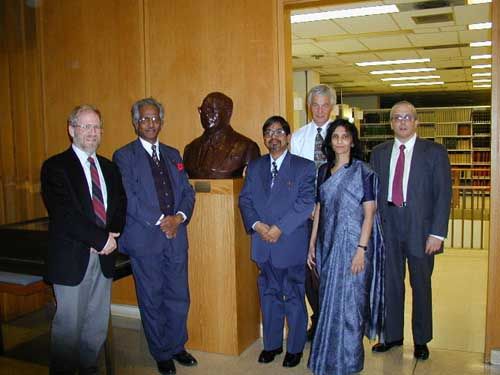 - Participated in UN-NGO Committee on the Rights of Child held in Geneva during State party India report discussion and raised the plight of 110 million child labor and child prostitution (devadasi system) mostly from SC/ST community (HRW report 1996) and submitted recommendations for eradication of child labor, bonded labor and devadasi system. (June 1999)- Met World Health Organization(WHO) Deputy Director General of Dr. Bruntland and narrated the violation of health rights of more than 250 million untouchable and tribal. Shown him CNN-CBS 60 Minutes documentary ‘THE UNTOUCHABLES’ on the actual practice of caste system and untouchability in India.
- Participated in UN-NGO Committee on the Rights of Child held in Geneva during State party India report discussion and raised the plight of 110 million child labor and child prostitution (devadasi system) mostly from SC/ST community (HRW report 1996) and submitted recommendations for eradication of child labor, bonded labor and devadasi system. (June 1999)- Met World Health Organization(WHO) Deputy Director General of Dr. Bruntland and narrated the violation of health rights of more than 250 million untouchable and tribal. Shown him CNN-CBS 60 Minutes documentary ‘THE UNTOUCHABLES’ on the actual practice of caste system and untouchability in India. - ACJP delegation met Canadian Foreign Minister Mr. Lioyd Axworthy in Ottawa, Canada and narrated the problems of 250 million Dalits in India who assured to look into the problems seriously.
- ACJP delegation met Canadian Foreign Minister Mr. Lioyd Axworthy in Ottawa, Canada and narrated the problems of 250 million Dalits in India who assured to look into the problems seriously. - 1998: UN Commission on Social Development-NY & Conference on Caste System, Toronto-Participated in the UN Commission on Social Development (eradication of poverty) and lobbied for the attention of the commission members to address the marginalization and destitution of quarter billion population of Dalits in India.
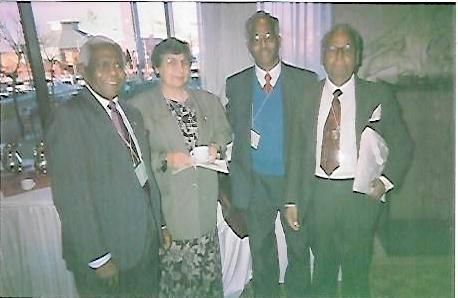 - Hosted a Conference in Toronto, Canada on Caste System, Practice of Untouchability and role of United Nations and Civil Society and sensitized participants on the issues of SC/ST in India. The distinguished UN expert of the committee on Human Rights, Mr. Martin Sheinin of Finland, delivered the keynote address in which he said that human rights violations like these should be addressed through different UN forums using different UN mechanisms which will help to create peace and justice in the civil society. Prof. Sam Lanfranco, Chair of the Deptt. of Economics, York University, Toronto, Canada and advisor to ACJP stressed the need for global community to be involved in this issue. Ms. Jane Jacobs, the globally recognized distinguished urban historian also spoke on the plight of the marginalized in India and asked the media to play important role to educate the civil society so, that it became a global challenge. Dr. Chris Queen from Harvard University, spoke on Engaged Buddhism and Dr. Ambedkar’s role in promoting peace and justice in India.
- Hosted a Conference in Toronto, Canada on Caste System, Practice of Untouchability and role of United Nations and Civil Society and sensitized participants on the issues of SC/ST in India. The distinguished UN expert of the committee on Human Rights, Mr. Martin Sheinin of Finland, delivered the keynote address in which he said that human rights violations like these should be addressed through different UN forums using different UN mechanisms which will help to create peace and justice in the civil society. Prof. Sam Lanfranco, Chair of the Deptt. of Economics, York University, Toronto, Canada and advisor to ACJP stressed the need for global community to be involved in this issue. Ms. Jane Jacobs, the globally recognized distinguished urban historian also spoke on the plight of the marginalized in India and asked the media to play important role to educate the civil society so, that it became a global challenge. Dr. Chris Queen from Harvard University, spoke on Engaged Buddhism and Dr. Ambedkar’s role in promoting peace and justice in India. - 1997: UN Committee on Civil and Political Rights-Geneva
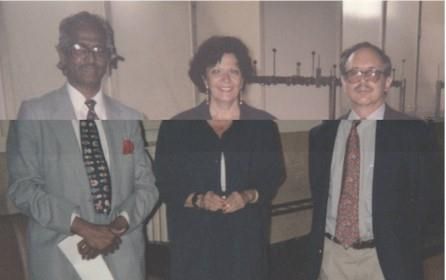 ACJP was invited and participated in the UN Committee on Civil & Political Rights during State Party India Report discussion. ACJP presented the paper explaining how the civil and political rights of SC/STs were violated regularly and gave many recommendations to improve the situations. Most of ACJP’s recommendations were included in the Concluding Observations. Detailed discussions are available in summary records 1603, 1604 & 1606 on UN website.Canadian TV Ontario made a documentary on ACJP contribution, to break the caste system through United Nations and Civil society, which was released on 2nd Jan, 97.Special Rapporteur on Racism, Racial Discrimination and Xenophobia of United Nations Mr. Glele –Ahanhonzo was briefed on the problems of caste atrocities and untouchability in India for which, he sought permission to visit India but Indian government had denied.
ACJP was invited and participated in the UN Committee on Civil & Political Rights during State Party India Report discussion. ACJP presented the paper explaining how the civil and political rights of SC/STs were violated regularly and gave many recommendations to improve the situations. Most of ACJP’s recommendations were included in the Concluding Observations. Detailed discussions are available in summary records 1603, 1604 & 1606 on UN website.Canadian TV Ontario made a documentary on ACJP contribution, to break the caste system through United Nations and Civil society, which was released on 2nd Jan, 97.Special Rapporteur on Racism, Racial Discrimination and Xenophobia of United Nations Mr. Glele –Ahanhonzo was briefed on the problems of caste atrocities and untouchability in India for which, he sought permission to visit India but Indian government had denied. - 1996: UN CERD Committee Geneva & Canadian parliament
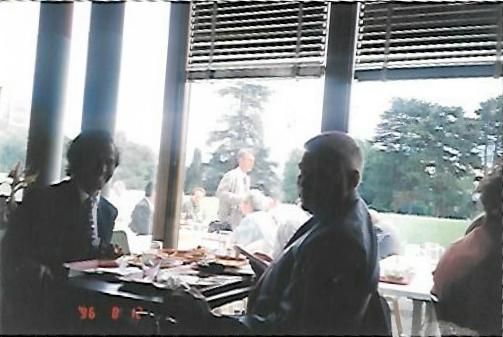 ACJP was invited by the Canadian Parliamentary Committee to participate in the debate on Child Labor and bonded labor and child prostitution in India and methods for their eradication. After ACJP presentation, Canadian Member of Parliament, Mr. Jessie Fliss, Toronto, supported whole heartedly the efforts of ACJP to eradicate the child labor and caste system in India.ACJP was invited to participate in the UN Committee on Elimination of Racial Discrimination (CERD) during State Party India report discussion. This was the first-time treaty body of United Nations discussed in detail the practice of caste system and untouchability and ruled that caste discrimination is same as descent based discrimination as per article 1 of the convention on Elimination of all forms of Racial Discrimination. The committee had shown great compassion and empathy against the sufferings of the SC/STs and accepted all recommendations of ACJP to prevent caste discrimination and caste atrocities.It is important to note that CERD gave very valuable recommendation in its Concluding Observations (CERD/C/304/Add.13 dated 17/09/96 article 31) which states that ‘the committee recommends a continuing campaign to educate Indian population on Human Rights, in line with the constitution of India & universal Human Rights Instruments, including the International Convention of All Forms of Racial Discrimination. This should be aimed at eliminating the institutionalized thinking of the high caste and low caste mentality’. Constitution of India with Discussion are available in summary records No.1161, 1162 & 1163. It was pioneering and historical contribution of ACJP.
ACJP was invited by the Canadian Parliamentary Committee to participate in the debate on Child Labor and bonded labor and child prostitution in India and methods for their eradication. After ACJP presentation, Canadian Member of Parliament, Mr. Jessie Fliss, Toronto, supported whole heartedly the efforts of ACJP to eradicate the child labor and caste system in India.ACJP was invited to participate in the UN Committee on Elimination of Racial Discrimination (CERD) during State Party India report discussion. This was the first-time treaty body of United Nations discussed in detail the practice of caste system and untouchability and ruled that caste discrimination is same as descent based discrimination as per article 1 of the convention on Elimination of all forms of Racial Discrimination. The committee had shown great compassion and empathy against the sufferings of the SC/STs and accepted all recommendations of ACJP to prevent caste discrimination and caste atrocities.It is important to note that CERD gave very valuable recommendation in its Concluding Observations (CERD/C/304/Add.13 dated 17/09/96 article 31) which states that ‘the committee recommends a continuing campaign to educate Indian population on Human Rights, in line with the constitution of India & universal Human Rights Instruments, including the International Convention of All Forms of Racial Discrimination. This should be aimed at eliminating the institutionalized thinking of the high caste and low caste mentality’. Constitution of India with Discussion are available in summary records No.1161, 1162 & 1163. It was pioneering and historical contribution of ACJP.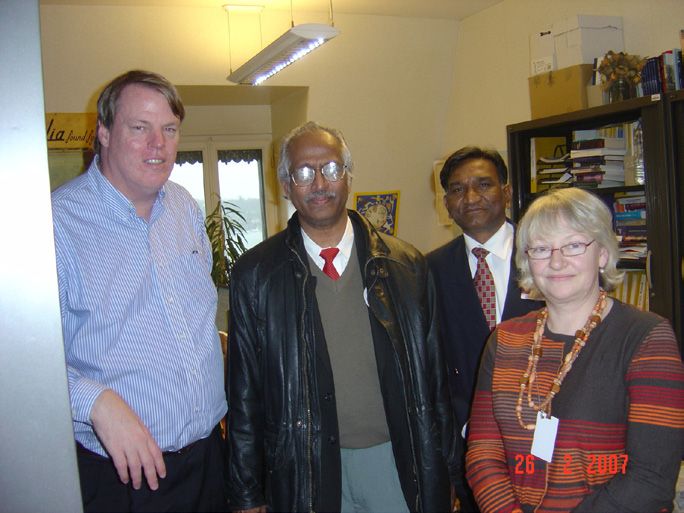
- 1995: World Summit on Social Development-CopenhagenACJP was invited and participated in the World Summit on Social Development (WSSD) (Eradication of Poverty) in Copenhagen, Denmark. ACJP highlighted the destitution of 250 million untouchables and tribals due to the caste system. An article in Denmark’s newspaper POLITIKEN appeared on 7th March 1995 on the problems of SC/ST which brought many Danish intellectuals to ACJP booth showing their solidarity with dalits. Swiss delegate Mr. J. F. Giovanni addressed caste system in his presentation at the summit.
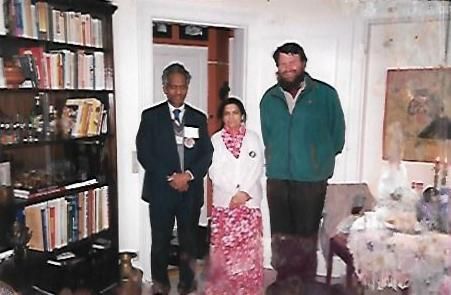 World Conference on Women’s Rights held in Beijing, China where Prof. Ana Maria Quiroz from Chile, ACJP advisor, represented dalit women issue and in collaboration with dalit women delegation from India jointly prepared the Beijing statement on problems of discrimination on SC/ST women of India.
World Conference on Women’s Rights held in Beijing, China where Prof. Ana Maria Quiroz from Chile, ACJP advisor, represented dalit women issue and in collaboration with dalit women delegation from India jointly prepared the Beijing statement on problems of discrimination on SC/ST women of India. - 1994: UN Sub-commission on Prevention of Discrimination of Minorities, Geneva & UN WGIPParticipated in the UN Working Group on Indigenous People (WGIP) and proposed the creation of human rights monitoring system within the mandate of WGIP for all indigenous peoples of the world including Dalits and Tribals in India.
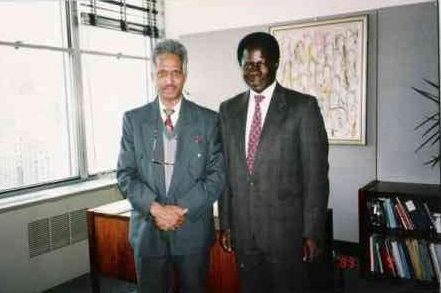 Participated in the UN Sub-commission on Prevention of Discrimination and Protection of Minorities and highlighted the problems of SC/ST as minorities in India specially the child labor.Met foreign governments of Canada, USA, Holland, Norway, Germany, and Sweden, briefed them on the Human Rights violations of SC/ST communities.
Participated in the UN Sub-commission on Prevention of Discrimination and Protection of Minorities and highlighted the problems of SC/ST as minorities in India specially the child labor.Met foreign governments of Canada, USA, Holland, Norway, Germany, and Sweden, briefed them on the Human Rights violations of SC/ST communities. - 1993: UN World Conference on Human Rights Vienna & WCHR Prepcom-Bangkok & UNESCO Conference -Montreal
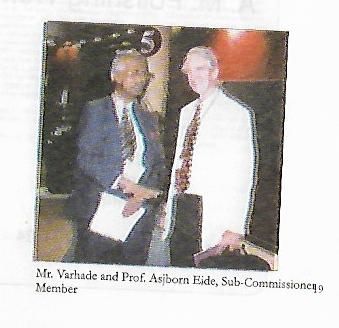 ACJP was invited and participated in UN World Conference on Human Rights at Vienna, Austria (June 1993). Due to ACJP’s extensive lobbying, a separate workshop on “Caste system, practice of untouchability, bonded labor, and United Nation’s role” was accepted for the first time in UN world conference. The resolution was passed in the workshop under the chairmanship of Ramos Horta (later Became the noble laureate from East Timore) and presented to the plenary session which approved it and was circulated. ACJP booth was visited by many European MPs and they signed the petition for supporting the Human Rights of SC/STs of India.
ACJP was invited and participated in UN World Conference on Human Rights at Vienna, Austria (June 1993). Due to ACJP’s extensive lobbying, a separate workshop on “Caste system, practice of untouchability, bonded labor, and United Nation’s role” was accepted for the first time in UN world conference. The resolution was passed in the workshop under the chairmanship of Ramos Horta (later Became the noble laureate from East Timore) and presented to the plenary session which approved it and was circulated. ACJP booth was visited by many European MPs and they signed the petition for supporting the Human Rights of SC/STs of India.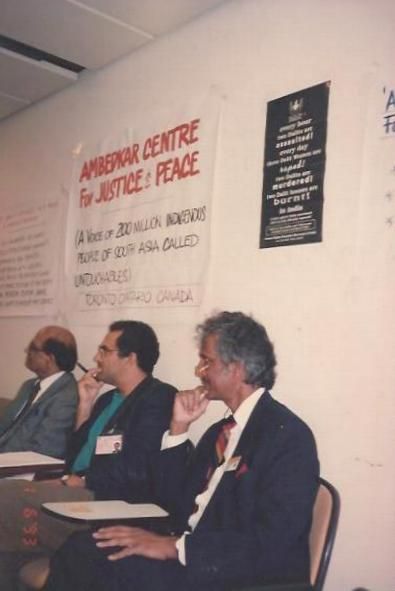 ACJP participated in Bangkok Prepcom of UN world Conference on Human Rights and succeeded in lobbying for important NGO declaration statement in favor of Dalits which was approved by majority NGOs from Asia and Pacific region “to eradicate the practice of untouchability, a crime against humanity, within period of ten years or the countries should face sanctions”.
ACJP participated in Bangkok Prepcom of UN world Conference on Human Rights and succeeded in lobbying for important NGO declaration statement in favor of Dalits which was approved by majority NGOs from Asia and Pacific region “to eradicate the practice of untouchability, a crime against humanity, within period of ten years or the countries should face sanctions”.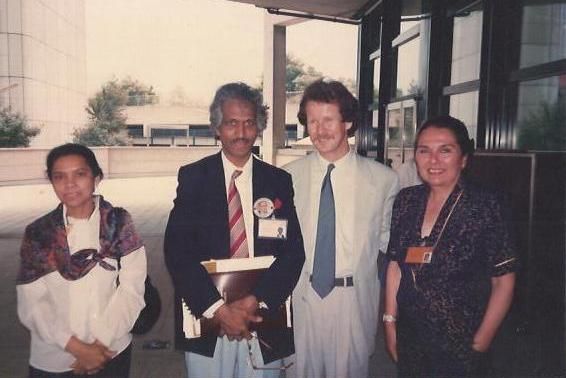 Attended Canadian Human Rights Conference organized by Canadian Government for the preparation of PREPCOM and asked Canadian delegates to work for dismantling the caste apartheid in South Asia.
Attended Canadian Human Rights Conference organized by Canadian Government for the preparation of PREPCOM and asked Canadian delegates to work for dismantling the caste apartheid in South Asia.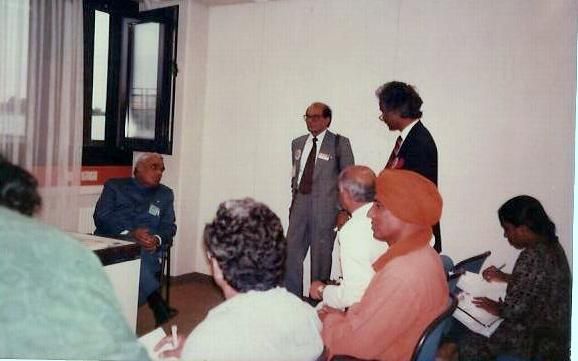 Attended UNESCO conference at Montreal and made many interventions on the issue of Dalits highlighting their plights.
Attended UNESCO conference at Montreal and made many interventions on the issue of Dalits highlighting their plights. - 1992: UN Working Group on Indigenous peoples- GenevaParticipated in the Working Group on Indigenous Population (WGIP) in Geneva and submitted documentation on indigenous background of Dalits as well as highlighted their human rights violations.
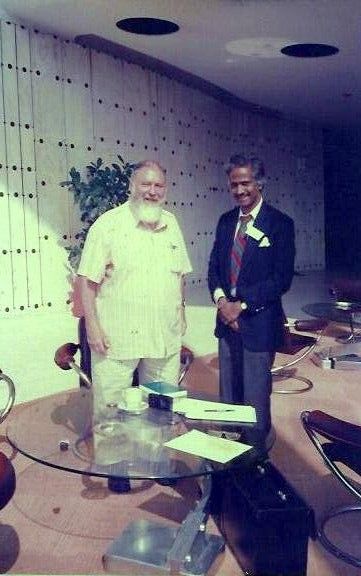 It was interesting to note that India did not like the study of Tribals and Dalits (ST/ST) to be included in the report of GLOBAL INDIGENOUS PEOPLES which was originally prepared by Prof. Williamson Diaz whose efforts helped to get started Working Group on Indigenous Peoples in UN, which in 1993 resulted in bringing all Indigenous Peoples of the world under one banner of UN and later on in 1993 UN Declaration on Indigenous Peoples passed by General Assembly came and Permanent Forum for indigenous People has been createdParticipated in the Dalit Conference organized by Swiss Church Aid Group at Basel, Switzerland in June and submitted the Dalit perspective for the liberation of Dalits.
It was interesting to note that India did not like the study of Tribals and Dalits (ST/ST) to be included in the report of GLOBAL INDIGENOUS PEOPLES which was originally prepared by Prof. Williamson Diaz whose efforts helped to get started Working Group on Indigenous Peoples in UN, which in 1993 resulted in bringing all Indigenous Peoples of the world under one banner of UN and later on in 1993 UN Declaration on Indigenous Peoples passed by General Assembly came and Permanent Forum for indigenous People has been createdParticipated in the Dalit Conference organized by Swiss Church Aid Group at Basel, Switzerland in June and submitted the Dalit perspective for the liberation of Dalits. - 1991: UN Working Group on Indigenous population -GenevaACJP participated for the first time in the UN Working Group on Indigenous Population and did interventions to highlight the issue of untouchability and caste discrimination on 250 million SC/STs indigenous peoples of India. Many indigenous participants were surprised by the information, since it was for the first time that the issue of Dalits as indigenous peoples was brought to their attention and the indigenous population was so high.
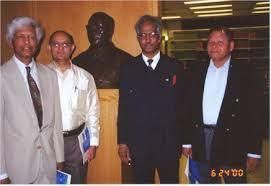 Hosted Dr. Babasaheb Ambedkar Birth Centenary Celebration and Human Rights Conference in Toronto Canada in June 1991.Mr Elijah Harper the great leader of Canadian Indigenous Peoples was the keynote speaker.
Hosted Dr. Babasaheb Ambedkar Birth Centenary Celebration and Human Rights Conference in Toronto Canada in June 1991.Mr Elijah Harper the great leader of Canadian Indigenous Peoples was the keynote speaker.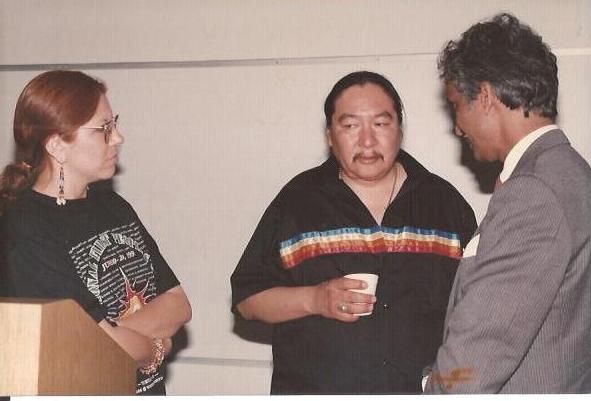 Mr. Yogesh Varhade and Mr. P. N. Arya along with other colleagues from VISION group coordinated the historic celebration of Dr. Ambedkar’s Birth Anniversary at Columbia University with half a day Human Rights Conference and half a day cultural programs. Indian Ambassador in US, Dr. Abid Hussain was the chief guest. Human Rights Conference was attended by most of the American scholars, who had done studies of Dalits and the caste system, and wrote extensively on the issues of Dalits. It was a great cultural celebration of dance and drama. 450 delegates from all over US came to participate in the event. It was the biggest south Asian Celebrations in the history of Columbia University, we were told.
Mr. Yogesh Varhade and Mr. P. N. Arya along with other colleagues from VISION group coordinated the historic celebration of Dr. Ambedkar’s Birth Anniversary at Columbia University with half a day Human Rights Conference and half a day cultural programs. Indian Ambassador in US, Dr. Abid Hussain was the chief guest. Human Rights Conference was attended by most of the American scholars, who had done studies of Dalits and the caste system, and wrote extensively on the issues of Dalits. It was a great cultural celebration of dance and drama. 450 delegates from all over US came to participate in the event. It was the biggest south Asian Celebrations in the history of Columbia University, we were told.